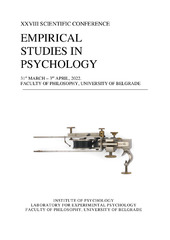Prikaz osnovnih podataka o dokumentu
Outcome Bias in Judging Revenge Pornography Toward Women
| dc.creator | Mijatović, Nevena | |
| dc.creator | Lazarević, Aleksandra | |
| dc.creator | Šljivić, Jasmina | |
| dc.creator | Conić, Ljubica | |
| dc.date.accessioned | 2023-10-05T17:17:04Z | |
| dc.date.available | 2023-10-05T17:17:04Z | |
| dc.date.issued | 2022 | |
| dc.identifier.isbn | 978-86-6427-199-8 | |
| dc.identifier.uri | http://rifdt.instifdt.bg.ac.rs/123456789/2935 | |
| dc.description.abstract | Revenge pornography refers to any kind of uploading or publishing private photos or videos of someone without their consent. At the beginning of 2021, the public in the Balkans region found out about private groups on social networks, counting around 30,000 participants, mostly men, involved in revenge pornography toward women. Laws in Serbia do not explicitly prohibit revenge pornography. In this study, we wanted to examine whether legal consequences for the perpetrator would affect the negative public opinion of revenge pornography acts. The sample consisted of 509 participants (70% women), with an average age of 36.5 (SD = 13.2), and slightly more liberal according to self-assessment on a broad social attitudes scale ranging from 1 - liberal to 7 - conservative (M = 3.1, SD = 1.5). Firstly, all participants read a vignette describing a bogus case of a woman whose pictures a man posted online. Further, half of them read the second part about the legal consequences the perpetrator has suffered for his act - imprisonment, while the other half of participants read that he was not punished due to revenge pornography not being officially prohibited in our country. All participants provided judgment of the act itself on a 7-point scale ranging from 1 - very bad to 7 - very good, as well as their opinion on who is to blame for this act, also on a 7-point scale: 1 - the woman, 4 - both equally, 7 - the man. These judgements were provided twice, once after reading the first part of the vignette and after reading the second part. We expected that change in judgments would be led by outcome bias. Actually, in both of the judgment measurements, 90% of participants marked the act of the man as very bad. Due to the ceiling effect, we did not proceed with the planned analysis of change. The distribution of answers on the responsibility scale was trimodal (on word anchors) and negatively asymmetric because 52% of participants said that the man should take responsibility. We did not test if the change in victim-blaming is moderated by gender because of the insufficient number of men per experimental group. Whatsoever, a Wilcoxson signed-rank test (W = 50.50, p = .007) showed that all participants who read about the legal consequences blamed the perpetrator slightly more afterwards, which did not happen in the other group (W = 47.00, p = .054). Legal consequences can reduce victim-blaming and consequently form a social norm by which revenge pornography toward women is perceived as deviant behaviour. | sr |
| dc.language.iso | en | sr |
| dc.publisher | Institut za psihologiju i Laboratorija za eksperimentalnu psihologiju, Filozofski fakultet, Beograd | sr |
| dc.relation | info:eu-repo/grantAgreement/MESTD/inst-2020/200025/RS// | sr |
| dc.rights | openAccess | sr |
| dc.rights.uri | https://creativecommons.org/licenses/by/4.0/ | |
| dc.source | [Knjiga rezimea] / XXVIII naučni skup Empirijska istraživanja u psihologiji | sr |
| dc.subject | revenge pornography | sr |
| dc.subject | online abuse | sr |
| dc.subject | judgment | sr |
| dc.subject | victim-blaming | sr |
| dc.subject | public opinion | sr |
| dc.title | Outcome Bias in Judging Revenge Pornography Toward Women | sr |
| dc.type | conferenceObject | sr |
| dc.rights.license | BY | sr |
| dc.citation.issue | 1 | |
| dc.citation.spage | 117 | |
| dc.citation.epage | 117 | |
| dc.type.version | publishedVersion | sr |
| dc.identifier.fulltext | http://rifdt.instifdt.bg.ac.rs/bitstream/id/13584/bitstream_13584.pdf | |
| dc.identifier.rcub | https://hdl.handle.net/21.15107/rcub_rifdt_2935 |

